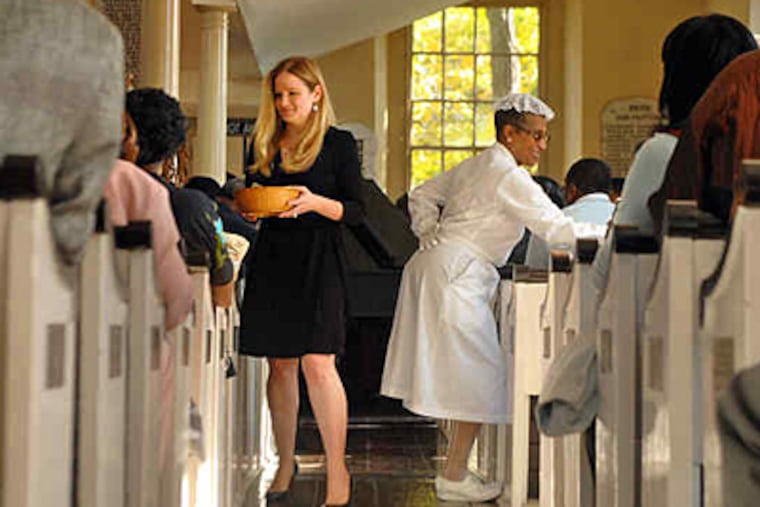Methodist congregation, split by racism 200 years ago, unites
With prayer and oratory, forgiveness and grace, a Methodist congregation separated by racism more than 200 years ago united yesterday for the first time for Sunday morning services.

With prayer and oratory, forgiveness and grace, a Methodist congregation separated by racism more than 200 years ago united yesterday for the first time for Sunday morning services.
The schism occurred in the late 1780s or early 1790s - no one is sure - when African Americans who had been worshiping at St. George's Methodist Church on Fourth Street in Old City were thrown out by white congregants as they were on their knees praying in the balcony.
The African Americans left and eventually formed the African Methodist Episcopal Church at Sixth and Lombard Streets, which later became a stop on the Underground Railroad and is now Mother Bethel A.M.E.
Yesterday, as an organ reverberated throughout the plain but solid church, Mother Bethel congregants were welcomed back to St. George's for services at 11 a.m. - once called "the most segregated hour in this nation" by the Rev. Dr. Martin Luther King Jr., referring to the centuries-old practice of blacks and whites worshiping separately.
As many as 300 Mother Bethel worshipers crowded into St. George's, this year celebrating its 240th anniversary by cleansing a centuries-old sin. Most, if not all, of St. George's tiny congregation of 30 showed up.
"Thank you. Thank you for coming," St. George's pastor, the Rev. Fred Day, told the Mother Bethel group from an elevated pulpit that nearly reached the balcony, which, before the banishing, was for black worshipers only.
"You bless us in a way mere words fall short. The memory of what happened - hurt, hostility, disgrace, and disappointment - did not keep you from being here today. You grace us in coming."
Before delivering a stirring sermon that drew cheers that rocked the aging edifice, Mother Bethel's pastor, the Rev. Mark Kelly Tyler, told the blended group: "We thank the congregation for its hospitality and courage. We feel like a child coming back home to its mother."
In an emotional gesture that drew a gasp from the audience, Day presented Tyler with a handmade cross, saying, "Our ancestors built the balcony to segregate black and white. I'm giving you a cross made from the nails that built this balcony."
Tyler, visibly moved, later raised the cross above his head as he roared the ending moments of his sermon, which preached the importance of not holding on to hatred.
"I'm so glad you gave me this today," he shouted, as the congregation stood and cheered. "He took the nails from the balcony!"
By the time the final hymns were sung, it was as if demons had been exorcised and a 200-year-old abyss had been bridged.
"Oh, my God, it was uplifting," said Arlene Matthews, 61, a Mount Airy resident who works in retail sales. Her late grandmother had worshiped at Mother Bethel and had felt a lingering anger over the racist act that was the catalyst for her church's founding.
"I came today for my grandmother. She would have been here. After 200 years, for this to happen is a glorious occasion."
The genesis for the reunion idea was a conversation not long ago between Tyler and Day.
Day asked Tyler to preach as part of the 240th anniversary. "Why don't I bring Mother Bethel with me?" Tyler asked Day. Tyler recalled the conversation in an interview last week.
He acknowledged that "a few persons in both congregations were wondering why this was necessary," Tyler said. "A few in our church didn't think going back could ever change anything. And there was some apprehension of us returning on the other side."
But no dissonance was ever expressed, and both congregations overwhelmingly approved the idea, said Tyler, who had been looking forward to his moment in St. George's pulpit.
"It almost defies words to go back to preach in a place that our founder, Richard Allen - who had been pulled off his knees in morning prayer - had vowed never to return to," Tyler said. "It's a sense of rejoicing, moving beyond bitterness."
Of course, Tyler and Day said, the coming together of the congregations doesn't obscure racism's persistence.
Just a few blocks away at the Constitution Center, Barack Obama delivered a moving speech on racism during last year's presidential campaign, Tyler said.
"But," he preached during the service yesterday, "we're still trying to figure out who's swimming next to our children in swimming pools," referencing alleged racism at the Valley Club in Huntingdon Valley in June when African American children were disinvited from the mostly white club.
Still, the day's events inspired hope, according to the participants.
"This is phenomenal," said Laticia Stauffer, 34, a St. George's congregant and a psychologist in the School District of Philadelphia. "It's a blessing to be part of the new history we are making today."
Ultimately, it was a satisfying Sunday for Nathaniel Chatman, 61, a Mother Bethel congregant and a retired Philadelphia police officer from West Philadelphia. He was wearing white gloves, working as a guest usher at St. George's yesterday.
"This is the church we came from," he said. "See, we look like this," he added, taking off his white glove to reveal his black hand. "God loves us, too."